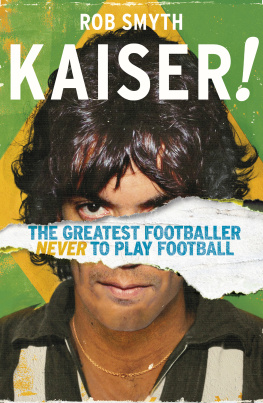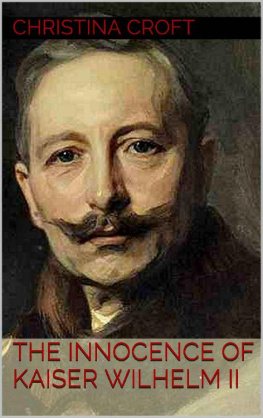CONTENTS
ABOUT THE BOOK
1980s Rio de Janeiro.
Theres only one king in this city and hes got the mullet, swagger and fake ID to prove it.
Introducing Carlos Henrique Raposo, known to all as KAISER.
This guys got more front than Copacabana beach. Hes the most loveable of rogues with the most common of dreams: to become a professional footballer. And he isnt about to let trivial details like talent and achievement stand in his way not when he has so many other ways to get what he wants.
In one of the most remarkable football stories ever told, Kaiser graduates from abandoned slumdog to star striker, dressing-room fixer, superstar party host and inexhaustible lover.
And all without kicking a ball.
Hes not just the king hes the Kaiser.
ABOUT THE AUTHOR
Rob Smyth has worked on the Guardian sports desk since 2004 and has written or edited eight books, including Danish Dynamite: The Story of Footballs Greatest Cult Team. He has also worked for Manchester United, the Daily Telegraph, The Times, ITV, Sports Illustrated and FourFourTwo.
To Carlos Alberto Torres, a sheer delightful human being.
I hope that my truth pleases you, because there are many truths, many truths. Its up to you to decide which is the true truth Ronaldo Lus Nazrio de Lima, talking to Congress about his convulsion on the day of the 1998 World Cup final
CHAPTER 1
THE STAR SIGNING
Carlos Kaiser wasnt in the mood to play football. The journey from Rio de Janeiro to Corsica had taken the best part of twenty-four hours, during which the only thing in danger of going to sleep were his squashed legs. This was just a fleeting visit, a chance to survey his new kingdom before he introduced himself to his hotel bed. He hadnt expected a welcome like this. The Stade Mezzavia, home of Gazlec Ajaccio FC, was heaving with anticipation. Hundreds of fans had congregated on the austere concrete terrace behind one of the goals, keen to see the unveiling of the clubs new Brazilian forward.
Word had spread around Corsica about Kaisers CV. Hed played for Botafogo, Flamengo and Fluminense, three of the biggest clubs in Brazil, and been world champion with Independiente of Argentina. Kaiser stifled a yawn and waved to the supporters. I bet, he thought to himself, they didnt get this excited when Napoleon came home.
At twenty-four, Kaiser was approaching his peak. Hed been recommended to Ajaccio by his friend Fabinho, who had joined the club a year earlier. And though Kaiser had been struggling with a succession of niggling injuries for a couple of years, an explosive video of his goals suggested he was well worth the gamble especially for a mid-table Ligue 2 side. In their seventy-seven-year history, Ajaccio had never signed a player of this stature.
Kaiser decided that, as everyone had made such an effort to greet him, he should put on a bit of a show.
Fabinho, get me a bunch of flowers, he said.
Kaiser, this is a football stadium in the middle of nowhere. Where am I going to get flowers?
Ive been here five minutes and youre asking me where to get flowers? Use your initiative.
Fabinho tutted and set off on his errand. When he returned ten minutes later with a handful of roses, procured from the secretarys office, Kaiser took them and ran towards the touchline. He jumped over the advertising boards, clambered up the cheap seats and ostentatiously presented the flowers to the wife of the club president. Kaiser dispensed hugs and kisses to anyone in sight before returning to the field, where he grabbed a Corsican flag and used it as a cape. He had been told that Corsicans, like Basques in Spain, were fiercely independent.
Kaisers internal monologue celebrated a triumphant unveiling. The serious business the actual football was still to come. He noted that a surprising proportion of the crowd were female, and his mind started to wander. Kaiser had an image of Corsica in his head. He saw a bohemian, enlightened milieu, populated by brunettes in pastel-coloured, roll-neck jumpers, smoking pencil-thin cigarettes and teaching him about the Impressionists before seducing him behind sheer linen curtains that billowed in the breeze. He was starting to lose himself when, in his peripheral vision, he noticed a squat old man dragging out a bag of footballs. Kaiser, using Fabinho as a translator, asked what was happening. The answer distressed him. The owners wanted Kaiser to show off his exotic skills to the crowd.
Kaiser was interested in keeping up appearances, not doing keepy-uppies. He started moaning to nobody in particular, still speaking in Portuguese. I flew in on a fucking sardine can and have hardly got any feeling in my legs. Cant we do this tomorrow? As Kaiser harrumphed, a series of balls were lined up on the edge of the penalty area.
Fabinho, he said, could you go and get my sunglasses? Theyre in the Mizuno bag in the dressing room. Thanks, man.
When Fabinho departed, Kaiser jogged towards the line of footballs and hoofed one into the crowd. A souvenir, he explained in Portuguese, calculating that nobody else spoke the language. While everyone tried to work out what Kaiser was saying, he hammered ball after ball into the crowd.
I got a standing ovation, says Kaiser thirty years later. It was intentional, so that I didnt have to train. The kit guy kept one ball because he said there was going to be a training session. I grabbed that off him and belted it into the crowd as well. The fans all left with their souvenirs and there were no balls left.
With none of the supporters wanting to give back their expensive souvenir, the management team decided to call it a day. Kaiser raised both hands above his head and clenched his fists triumphantly before walking towards the dressing room, his work done. He hadnt been in the mood to play football. What he knew, and what nobody at Ajaccio could ever know, was that their star signing was never in the mood to play football.
CHAPTER 2
THE ALTER EGO
Carlos Kaiser was born at the age of ten. Until then he was a chubby, football-mad kid called Carlos Henrique Raposo, who came into the world kicking and scheming on 2 July 1963. Carlos Henrique is a man, he says. Carlos Kaiser is a character. I created that alter ego when I went to play for Botafogo. I promised myself I was going to be somebody. I wanted to show that a kid who came from a tough upbringing could be respected by society.
A tough upbringing, and a bizarre one. Kaiser was born in Porto Alegre, in the south of Brazil, and was barely a week old when he was adopted though thats a generous term for what actually happened. His biological mother asked a stranger to look after her baby for five minutes while she dealt with an emergency. She never returned. The stranger, desperate for a child of her own, was in Porto Alegre visiting family. They suggested it was a sign from above and that, rather than go to the police, she should keep the child. A few days later she made the 1600km journey home to Rio de Janeiro with her newfound baby.
As he grew up Kaiser wondered why he was white, like his father, when his mum was black. His parents eventually explained his backstory. He later heard from some of his extended family that his biological father was a famous politician who had an affair with a maid, and that he was discarded so that their relationship remained a secret. Another version is that Kaiser was stolen from his biological mother in Porto Alegre. With Kaiser, there are usually a few sides to every story.















